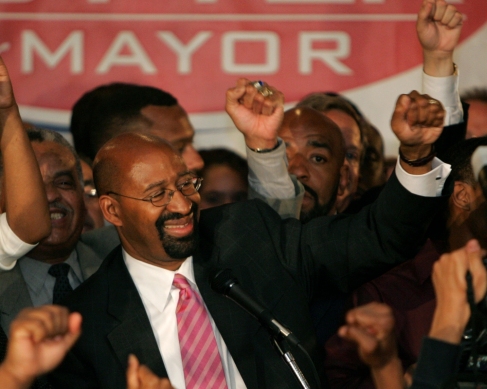WASHINGTON — The two most popular guys at the Hyatt Regency ballroom on Capitol Hill on Thursday were Mayor Nutter and the New York York City health commissioner, and both were beloved for precisely the reasons that they have endured ridicule across the nation: taking on Big Soda.
“I’m in love with Mayor Nutter,” said Kirsten Aird, a public health educator, whose excitement at hearing an elected official “so eloquently” describe the challenges of obesity and smoking moved her to spontaneously call her boss in Portland, Ore.
This was the National Soda Summit, a 1½-day gathering of 250 public health workers and researchers who wanted to hear the latest science about the effects of sugary drinks on the body and the latest thinking about how to convince a skeptical public that they can be harmful.
New York Mayor Michael Bloomberg’s highly controversial proposal last week to ban the sale of sugar-sweetened beverages larger than 16 ounces at restaurants, stadiums, delis, and food carts had energized the crowd. Bloomberg wasn’t there. His health commissioner, Thomas Farley, who has been pilloried for the idea, was warmly received.
But Nutter’s keynote address brought a standing ovation. He said the concept of limiting supersize drinks was “a very bold strategy” that was “worth all of us evaluating and considering.” In an interview, he said he had asked the Health Department to review it but had not formed an opinion, and did not even know if he had the authority to do something similar.
In the end, it was Nutter’s descriptions of a sincere, long-term commitment to controversial public health measures that turned on the crowd. He said that the city’s antismoking regulations were the most important accomplishment of his 15 years on City Council, that the city’s menu-labeling law is the strongest in the nation, and that his twice-unsuccessful fight to impose a 2-cent-per-ounce tax on sugary drinks was worth the fight.
He also acknowledged that a counterargument from the sugar-drink industry carries some weight in the debate. The science showing that sugary drinks are a health hazard, while compelling, has yet to prove cause and effect on a large scale.
“That’s why I am calling for the same kind of report on sugar-sweetened beverages as the surgeon general” researched and issued on tobacco in 1964, he said.
A few hours later, Sen. Frank Lautenberg (D., N.J.) announced that he had introduced an amendment to the farm bill requiring the federal government to study a possible link between sugary beverages and obesity. His office said the idea had been around for a while and was introduced Thursday when the farm bill was taken up by the Senate.
The beverage industry says that taxing or banning sugar-sweetened beverages would have little effect on health because people ingest sugar from a range of snacks and other foods. It also says that Americans should be allowed to drink what they want.
Both arguments have resonated with much of the public, and “nanny state” worries have dominated editorial pages, social media, and sidewalk conversations.
Thursday’s conference was sponsored by the Center for Science in the Public Interest, a consumer research and advocacy group that has been a key player in pressing for nutrition regulations and a longtime critic of the beverage industry. Several scientists who spoke have taken stands in support of limiting sugar.
Farley put up an image that he said was from the Coca-Cola museum showing a vintage ad for a bottle of soda. “Serves 3 people,” the ad reads, “big 16-ounce size.” That is the size cup that New York is hoping to make the maximum.
Kelly Brownell, director of Yale University’s Rudd Center for Food Policy and Obesity, predicted that public opinion would turn against the industry in the next five to 10 years, much as it did with tobacco a generation ago, partly as evidence accumulates that certain foods are addictive.
The evidence against sugar “is very strong,” said Brownell.
Perhaps the most compelling speaker was neither a scientist nor a public health official but a marketing expert who said he had nothing against soda, although he believed the soda industry had become too powerful.
Todd Putnam, a former vice president of innovation for the Coca-Cola brand, said the soft-drink industry spent $11 billion advertising sugar-sweetened beverages in 2011 — a sharp increase from the past — and had it down to a science that astounded many in the room, including him.
The overriding goal for a soda executive: “Get more ounces per day into more people,” said Putnam, who runs a consulting firm that works with health/wellness brands.
To accomplish that, he said, beverage companies had a unique strategy: “Increase share of stomach.”
